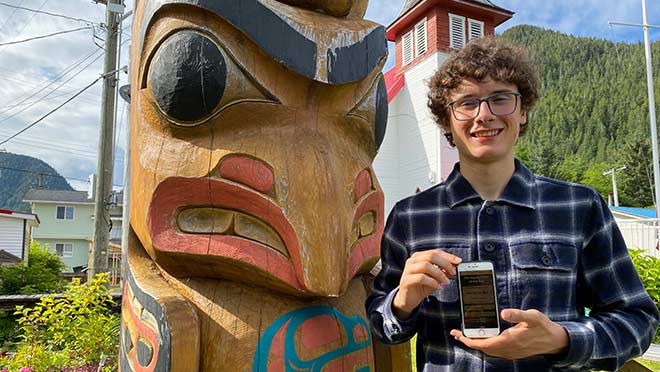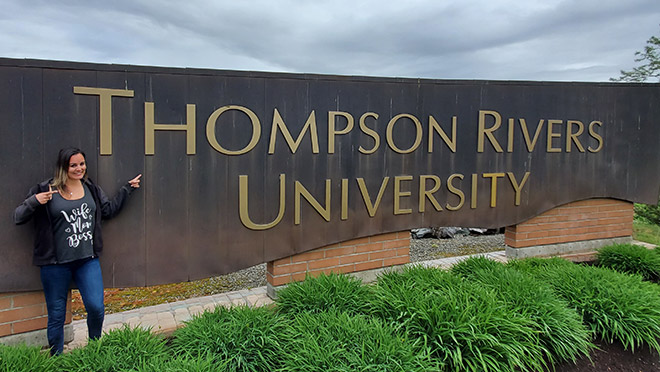How do you say 'unstoppable' in Sm'algyax?

Word of the Day website founder wins our top Indigenous scholarship
With the number of fluent speakers of the Indigenous language Sm’algyax down to a few dozen, Brendan Eshom is on a mission to keep it very much alive. And the way he has gone about it has earned him praise from Elders and a fervent following on his Sm'algyax Word of the Day website and social media apps.
"Our language is important because it's really connected to our culture, in our place names, and in the names of our territories," says Eshom, last year’s winner of BC Hydro’s top Indigenous scholarship, the $8,000 Randy Brant Memorial Award that emphasizes community involvement. "Our histories are also written in Sm'algyax. And when they're translated into English, they're never perfect or fully encompass what's being said."
A 21-year-old science student at UBC, Eshom grew up in Prince Rupert as a member of the Ts'msyen peoples First Nation community of Gitga'at at Hartley Bay. He says he first learned about BC Hydro's scholarship program on a website a few years ago, and he's now a three-time winner of one of the more than three dozen scholarships and bursaries that we give out each year.
Our scholarship program is one of the ways we support the development of young Indigenous people in our province. The scholarships are available to First Nations or Indigenous permanent residents of B.C. who are studying at an accredited post-secondary institution in a program that matches a career at BC Hydro. We know that Indigenous perspectives, ideas, and expertise help us make better decisions and better understand our customers and we are actively working to increase our Indigenous representation in our workforce. Applications for 2024 awards are now open, through June 28, 2024.
Sm'algyax is taught at Prince Rupert's schools
Eshom’s online Sm'algyax word sites and apps are an example of how Ts'msyen Nation peoples are working to keep the language alive. Prince Rupert's School District 52 offers Sm’algyax language learning starting in kindergarten right through to high school, when students can choose between French and Sm'algyax.
Eshom used that training to become conversant in the language and has used it when he speaks at public events, and to provide English translations of spoken talks by Elders in the community. He estimates that his 98-year-old great grandmother Helen Clifton is one of only a few dozen remaining fluent speakers of Sm’algyax.
"There are elders who are fluent, and also some language teachers that are fluent who are probably in their twenties and thirties and forties," he says. "There's a lot of work to do so that we don’t lose Sm’algyax as an Indigenous language. But I think we're in a positive place with it right now. There’s even a course at UNBC that I think is also offered as a virtual or hybrid class for learning Sm'algyax."
Despite some hurdles, Eshom gets the word out
In his quest to help ensure his language doesn’t disappear, Brendan Eshom watched one of the key tools in that fight – a Sm’algyax Word app – disappear from the Apple App Store back in 2021.
When he couldn’t get in touch with anyone at Apple to explain why his work was being deleted as fraudulent, he went public. Thanks to a Global News Consumer Matters investigation, his developer rights, and the app – which once hit No. 104 on the top Apple Apps chart – were restored. The company apologized and explained that it had mistakenly deleted it as part of its regular sweep of fraudulent apps.
But guess what? It has vanished again.
"It's really, really difficult to get a hold of Apple to fix this," says Eshom. "Maybe I need to contact Consumer Matters again."
Despite that hurdle, Eshom’s Sm'algyax Word idea lives on, as a popular website, on Google Play, Instagram, Facebook, and on YouTube.
"One of my big ways to reach people is through a word of the day text message," he says of the feature, which is available at +1-289-796-0986. "It brings you to my website, and it's been quite popular. I also have about 1,500 followers on Facebook."
In a matrilineal society, Eshom is a member of the Ts'msyen killer whale clan
In large part due to; his interest in preserving the language, Eshom has a strong understanding of the history of his people and of the Gisbutwa̱da (Killerwhale-blackfish) clan he is part of.
The Ts'msyen Nation consists of up to 10,000 members spread over seven communities along the northwest coast of B.C. – mainly around Prince Rupert and Terrace – plus the community of Tak'waan in Alaska. A matrilineal society, descent among the Ts'msyen is traced through the female line, with members traditionally marrying someone from a different clan.
In his fourth year of studying at UBC, the former winner of the Lieutenant Governor of B.C.’s Reconciliation Award envisions eventually returning to live among his people in the Prince Rupert area.
"I probably will live there when I'm older," he says. "I enjoy living in Vancouver, but really do enjoy small towns. At least once a year during the summer I visit my great grandmother and other family members to fish, harvest seaweed, and to camp in the territory."
No doubt the Gitga'at elders – borrowing one of Eshom’s recent words of the day – are always Lu'aam G̱oot [happy] to see him.
Related:
